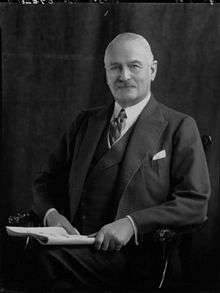Archibald Williamson, 1st Baron Forres

Archibald Williamson, 1st Baron Forres PC (13 September 1860 – 29 October 1931), known as Sir Archibald Williamson, 1st Baronet, from 1909 to 1922, was a Scottish businessman and Liberal politician.
Early life
The eldest son of Stephen Williamson MP, and Annie Guthrie, Williamson was educated at Craigmount School,[1] Edinburgh and at Edinburgh University.
Career
He was Liberal Member of Parliament for Elginshire and Nairnshire from 1906 to 1918 and then for Moray and Nairn until June 1922. He entered parliament in the aftermath of the 1906 Liberal landslide election, taking a seat from the Conservatives.
He was created a Baronet in 1909. He sought re-election 4 years later at the General Election and was returned with a reduced majority.
At the General Election in December 1910 in Elginshire and Nairnshire he was re-elected unopposed.[2]
He was Chairman of a number of Home Office, Board of Trade and parliamentary committees and was a member of the Mesopotamia Commission of Enquiry in 1916. He was appointed a Privy Counsellor in 1918. For the 1918 General Election his constituency was abolished and a new constituency Moray and Nairn was created for which he was adopted by the Liberals as candidate. As a supporter of David Lloyd George and his Coalition Government, he was endorsed as their candidate. As no other candidate came forward, he was again returned unopposed. Williamson held junior ministerial office as Financial Secretary to the War Office from 1919 to 1921. In June 1922, before the next general election, he was raised to the peerage as Baron Forres, of Glenogil in the County of Forfar.
Outside Parliament, he was a director of the Central Argentine Railway and of several other companies.
Lord Forres was twice married, first in 1887 to Caroline Maria Hayne (died 1911), and second in 1912 to Hon. Agnes Freda Herschell, daughter of Farrer Herschell, 1st Baron Herschell. He died in October 1931, aged 71, and was succeeded in his titles by his son Stephen.
Election results
| Party | Candidate | Votes | % | ± | |
|---|---|---|---|---|---|
| Liberal | Archibald Williamson | 3,006 | 66.0 | ||
| Conservative | Harry Hope | 1,546 | 34.0 | ||
| Majority | 1,460 | 32.0 | 35.8 | ||
| Turnout | 79.1 | ||||
| Liberal gain from Conservative | Swing | ||||
| Party | Candidate | Votes | % | ± | |
|---|---|---|---|---|---|
| Liberal | Sir Archibald Williamson | 2,917 | 62.7 | -3.3 | |
| Liberal Unionist | Ralph George Campbell Glyn | 1,734 | 37.3 | +3.3 | |
| Majority | 1,183 | 25.4 | -6.6 | ||
| Turnout | 80.9 | +1.8 | |||
| Liberal hold | Swing | -3.3 | |||
Notes
- ↑ George Edward Cokayne, Vicary Gibbs, The complete peerage of England, Scotland, Ireland, Great Britain and the United Kingdom: extant, extinct, or dormant, Volume 13, page 375 Editors: Vicary Gibbs, Baron Thomas Evelyn Scott-Ellis Howard de Walden; (The St. Catherine press, ltd.) 1940
- ↑ Debrett's House of Commons and the Judicial Bench, 1916
- ↑ Whitaker's Almanack, 1907
- ↑ Debrett's House of Commons and the Judicial Bench, 1916
References
- Kidd, Charles, Williamson, David (editors). Debrett's Peerage and Baronetage (1990 edition). New York: St Martin's Press, 1990,
- Leigh Rayment's Peerage Pages
- Leigh Rayment's Historical List of MPs
External links
- Hansard 1803–2005: contributions in Parliament by Archibald Williamson
| Parliament of the United Kingdom | ||
|---|---|---|
| Preceded by John Edward Gordon |
Member of Parliament for Elginshire and Nairnshire 1906–1918 |
Constituency abolished |
| New constituency | Member of Parliament for Moray and Nairn 1918–1922 |
Succeeded by Thomas Maule Guthrie |
| Political offices | ||
| Preceded by Henry Forster |
Financial Secretary to the War Office 1919–1921 |
Succeeded by George Frederick Stanley |
| Peerage of the United Kingdom | ||
| New creation | Baron Forres 1922–1931 |
Succeeded by Stephen Williamson |